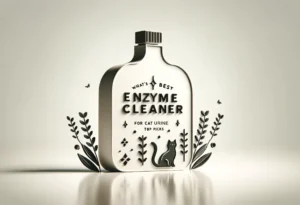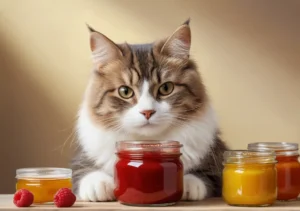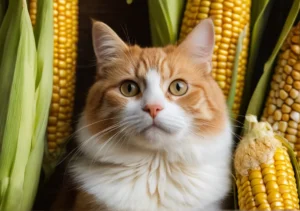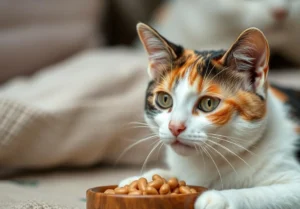Cats and milk seem like a classic pairing, but have you ever wondered why milk can give cats diarrhea?
Cats are lactose intolerant, meaning they lack the enzyme needed to properly digest lactose found in milk. This inability to break down lactose can lead to digestive issues like diarrhea when cats consume dairy products.
The Science Behind Lactose Intolerance in Cats
Have you ever wondered why milk gives cats diarrhea? Well, the answer lies in the science behind feline lactose intolerance. Unlike humans, most adult cats lack the necessary enzyme, lactase, to properly digest lactose, the sugar found in milk. This means that when a cat consumes dairy products like milk, the undigested lactose can ferment in their gut, leading to digestive upset such as diarrhea.
Without lactase to break down lactose into more digestible sugars, the excess lactose draws water into the intestine, causing loose stools and discomfort for your furry friend. This is why feeding your cat milk can often result in an upset stomach and diarrhea.
Symptoms of Lactose Intolerance in Cats
So, how can you tell if your cat is lactose intolerant and experiencing upset stomach symptoms after indulging in some milk? Keep an eye out for common signs such as diarrhea, vomiting, abdominal pain, and excessive gas. If your cat exhibits any of these symptoms after consuming dairy products, it’s a clear indication that they may be lactose intolerant.
To confirm the diagnosis, you can try eliminating milk from your cat’s diet and observing if their symptoms improve. If the digestive issues subside once dairy is removed, it’s a strong indicator that lactose intolerance is the culprit behind your cat’s tummy troubles.
Remember, even though cats may love the taste of milk, it’s best to avoid feeding it to them to prevent any uncomfortable digestive issues. Opt for feline-friendly treats and snacks that won’t upset their stomachs, keeping your furry friend happy and healthy.
Alternatives to Milk for Cats
It’s a common misconception that cats need milk to thrive. In reality, many felines are lactose intolerant, making milk a potential trigger for gastrointestinal upset like diarrhea. Instead of risking your cat’s tummy, consider offering lactose-free alternatives such as cat-specific milk available at pet stores. This specialized milk is formulated to be gentle on cats’ stomachs, giving them a treat without the troublesome aftermath.
Another tasty option is watered-down plain yogurt. The fermentation process in yogurt reduces lactose content, offering a creamy texture cats love without upsetting their delicate digestive systems. Alternatively, you can tempt your feline friend with bone broth or cat-friendly herbal teas as soothing and more digestible alternatives. Remember, when offering any new treat, introduce it gradually and monitor your cat for any adverse reactions.
Risks of Feeding Cats Milk
When it comes to cats and milk, it’s essential to understand the potential risks. Cat’s digestive systems are not equipped to handle lactose found in cow’s milk, which can lead to diarrhea, vomiting, and upset stomach. Continuous exposure to milk can disrupt the balance of beneficial gut bacteria in cats, potentially causing long-term gastrointestinal issues.
In addition to gastrointestinal distress, feeding your cat milk can contribute to obesity due to its high fat content and caloric density, leading to health problems down the line. For a healthier and more balanced diet, prioritize high-quality cat food enriched with nutrients tailored to feline needs. Always consult your veterinarian before making any significant changes to your cat’s diet for personalized advice.
Remember, the best way to show love to your furry friend is by being mindful of their unique dietary needs. So, swap the milk for cat-friendly alternatives to keep your feline companion happy and healthy.
Importance of Proper Nutrition for Cats
Proper nutrition is crucial for cats to thrive and lead healthy lives. A balanced diet ensures that they receive all the essential nutrients they need to support their bodily functions, maintain a healthy weight, and prevent various health issues. It is important to provide your feline friend with high-quality cat food that is specifically formulated to meet their dietary requirements. Avoid feeding them food that is rich in lactose like milk, as it can lead to digestive problems like diarrhea.
Tips for Introducing New Foods to Cats
Introducing new foods to your cat should be done gradually to prevent any digestive issues such as diarrhea. Start by mixing a small amount of the new food with their current food and gradually increase the proportion over a period of several days. Monitor your cat’s reaction to the new food and look out for any signs of gastrointestinal upset. Remember that cats can be picky eaters, so be patient and persistent when introducing new foods to them.
Helpful Tips for Introducing New Foods to Cats:
- Start Slow: Introduce new foods gradually to allow your cat’s digestive system to adjust.
- Monitor Reaction: Keep an eye on your cat’s stool consistency and overall well-being when introducing new foods.
- Consult a Vet: If you notice persistent digestive issues, consult your veterinarian for guidance on the best diet for your cat.
By following these tips and providing your cat with a balanced diet, you can help keep their digestive system healthy and prevent issues like diarrhea. Remember, a happy cat is a healthy cat!
Fun Facts About Cats and Dairy
Cats and dairy have a complex relationship that goes way back. While many people picture cats lapping up milk in a cozy cartoon scene, the reality is a bit different. Did you know that not all cats can digest dairy properly? It’s all thanks to lactose, a sugar found in milk that some cats simply can’t break down effectively.
Contrary to popular belief, most adult cats are lactose intolerant, meaning their bodies lack the enzyme needed to digest lactose after weaning. So that harmless saucer of milk you offer your furry friend might actually lead to an upset stomach and some messy consequences.
And here’s a twist : kittens are born with the ability to digest their mother’s milk, as nature intended. However, as they grow older, their bodies produce less lactase, the enzyme responsible for digesting lactose. This change is part of the natural weaning process, and offering milk beyond this point can lead to gastrointestinal issues.
So next time you feel tempted to treat your cat to a bowl of milk, remember that sticking to water or specially formulated cat milk is the safest bet for their tummy. After all, a happy cat means a happy owner!
Alex, a passionate animal lover, has experience in training and understanding animal behavior. As a proud pet parent to two dogs and three cats, he founded AnimalReport.net to share insights from animal experts and expand his knowledge of the animal kingdom.




